Order of the Cross of Liberty
The Order of the Cross of Liberty (Finnish: Vapaudenristin ritarikunta; Swedish: Frihetskorsets orden) is one of three official state orders in Finland, along with the Order of the White Rose of Finland and the Order of the Lion of Finland.
| Order of the Cross of Liberty Vapaudenristin ritarikunta Frihetskorsets orden | |
|---|---|
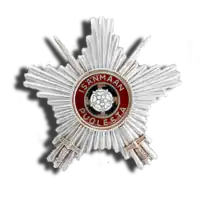 Order of the Cross of Liberty breast star with swords | |
| Type | Order |
| Country | |
| Presented by | the President of Finland |
| Post-nominals | Grand Cross: VR SR 1st Class: VR 1 2nd Class: VR 2 3rd Class: VR 3 4th Class: VR 4 1st Class Medal: VM 1 2nd Class medal: VM 2 Medal for Merit 1st Class: VR Am 1 Medal for Merit 2nd Class: VR Am 2 |
| Motto | Isänmaan Puolesta (Finnish: For the Fatherland) |
| Established | March 4, 1918 |
| Precedence | |
| Next (higher) | None |
| Next (lower) | Order of the White Rose of Finland |
Organisation
The President of Finland is the Grand Master of the Order of the White Rose of Finland and of the Order of the Lion of Finland, and usually of the Order of the Cross of Liberty as well, Grand Mastership of which is attached to the position of Commander-in-chief.[1] All of these orders are administered by boards consisting of a chancellor, a vice-chancellor and at least four members. The orders of the White Rose of Finland and the Lion of Finland have a joint board.
History
The Order of the Cross of Liberty was founded on March 4, 1918, upon the initiative of General C. G. E. Mannerheim. The Finnish artist Akseli Gallen-Kallela was commissioned to design the Order's insignia with the Old-Scandinavian Fylfot.
At its foundation there were seven classes: grand cross, cross of liberty (1st to 4th class) and the medal of liberty (1st and 2nd class). The decorations of the Order of the Cross of Liberty were initially conferred only in time of war. A decree was issued on 18 August 1944 enabling the decorations to be awarded in peacetime.
Also in 1944, Carl Gustaf Emil Mannerheim (1867–1951) was designated as Grand Master for life.[2]
Decorations of the order were awarded in great numbers during the World War II, partly due to Marshal Mannerheim having issued an order that wounded soldiers were to be awarded for their sacrifice, and Finland has no separate decoration for wounded. The Cross of Liberty is usually reserved for commissioned officers, with the Medal of Liberty being awarded for soldiers of junior rank and NCOs.
The Cross of Liberty has a red ribbon when it is granted in wartime and a yellow ribbon when it is awarded in peacetime. Associated with the Cross of Liberty is the Mannerheim Cross.
Classes
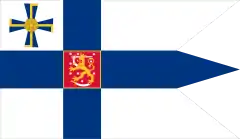 The Presidential Standard of Finland has a Cross of Liberty, 3rd Class on its upper left corner |
The classes of the Order of the Cross of Liberty, in descending order, with abbreviations are:
- Grand Cross of the Order of the Cross of Liberty (VR SR)
- Cross of Liberty, 1st Class with a grand star (neck order) (VR 1. rtk)
- Cross of Liberty, 1st Class (neck order) (VR 1)
- Cross of Liberty, 2nd Class (VR 2)
- Cross of Liberty, 3rd Class (VR 3)
- Cross of Liberty, 4th Class (VR 4)
- Medal of Liberty, 1st Class (VM 1)
- Medal for Merit, 1st Class (VR Am 1)
- Medal of Liberty, 2nd Class (VM 2)
- Medal for Merit, 2nd Class (VR Am 2)
Other special decorations awarded during the Second World War include:
- Medal of Liberty 1st Class on Rosette Ribbon (only awarded once, to Field Marshal Mannerheim)[3]
- Gold Medal of Merit; only awarded once, to General Waldemar Erfurth, 13 June 1944[3]
- Cross of Mourning (VR sururisti); given to the nearest relative of a soldier killed in action[4]
- Medal of Mourning (VM surumitali); given to the nearest relative of a person killed in non-military duty of war industry or national defence.[4]
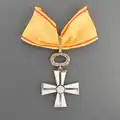 VR 1
VR 1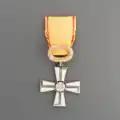 VR 2
VR 2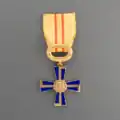 VR 3
VR 3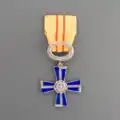 VR 4
VR 4 VR sururisti (Cross of Mourning)
VR sururisti (Cross of Mourning)
The awards above are for civilian accomplishments, signaled by the blue color in the 3rd and 4th classes, and in peacetime, as shown by the yellow ribbon. Awards for military accomplishments in the 3rd and 4th classes have a dark gray color replacing the blue, and are awarded with a red ribbon in wartime.
Notable recipients
- Arthur Zimmermann (1918)
- Rüdiger von der Goltz (1918)
- Einar Lundborg, Swedish aviator who participated in the Finnish Civil War (unspecified)
- Simo Häyhä, Finnish sniper with a confirmed body count of 505 during the Winter War (Cross of Liberty, 3rd and 4th class; Medal of Liberty, 1st and 2nd class)
- Jerzy Świrski, Polish Vice Admiral during World War II
- Erich Raeder, German naval leader during World War II (Grand Cross of the Order of the Cross of Liberty)
- Walter Nowotny, Austrian-born German fighter ace during World War II (Cross of Liberty 1st Class)
- Jorma Sarvanto, foremost Finnish fighter ace of the Winter War (Cross of Liberty 2nd Class, with swords)
- Karl Maria Demelhuber, Waffen SS Obergruppenführer
- Prince Wolfgang of Hesse, former Crown Prince of Finland, served in the Continuation War (Cross of Liberty, 3rd Class)
- Mauno Koivisto, former Prime Minister and ninth President of Finland; medal received while serving with Captain Lauri Törni in the Battle of Ilomantsi against the Soviet Union
- John F. "Jack" Hasey, American volunteer of the Iroquois Ambulance Corps who participated in the Winter War (Cross of Liberty, 4th Class, with swords)
- Nikolaus von Falkenhorst, German General who served as one of the commanders in the Continuation War (Cross of Liberty, 2nd Class)
- Kurt Kuhlmey, German Stuka pilot
References
- "Asetus 550/18.8.1944" (in Finnish). Order of the Cross of Liberty. Archived from the original on 2016-01-07. Retrieved 2009-11-28.
- "Säädökset alkuperäisinä: Asetus Vapadenristin ritarikunnasta. 550/1944". Finlex (in Finnish).
- Tetri 1994, p. 47.
- Tetri 1994, p. 49.
Sources
- Tetri, Juha E: Kunniamerkkikirja. Ajatus, 1994. ISBN 951-9440-23-2. (in Finnish)
External links
| Wikimedia Commons has media related to Order of the Cross of Liberty. |